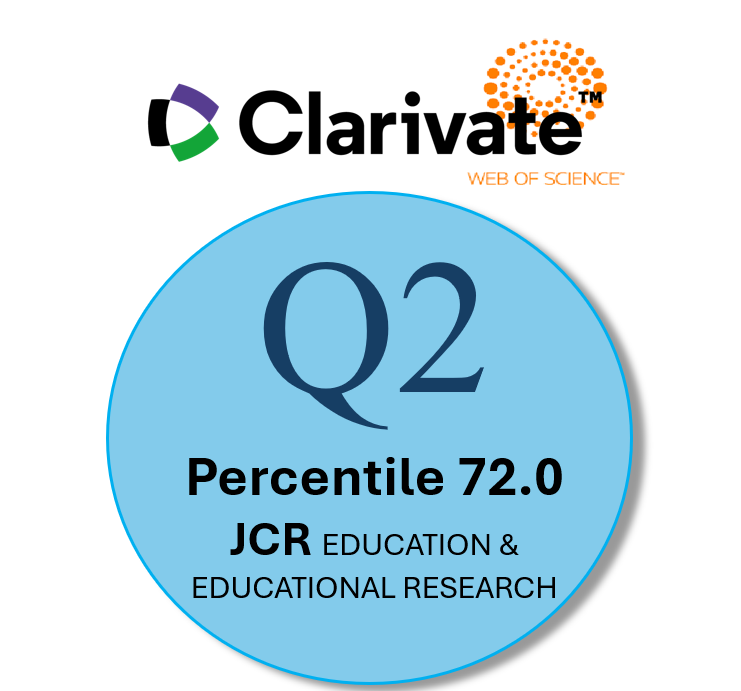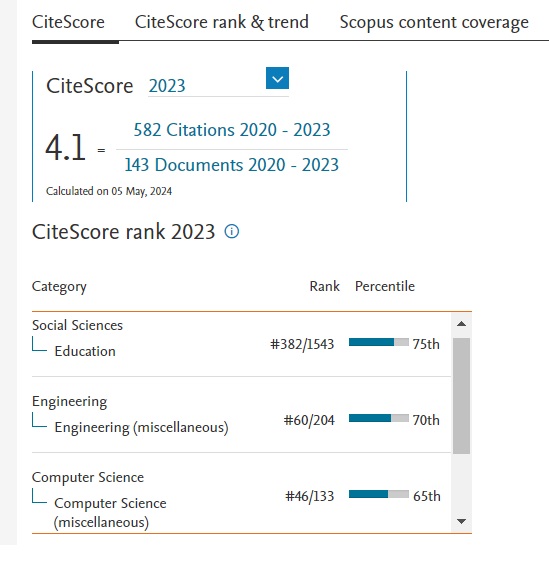Consideración del papel de la Zona de Desarrollo Próximo y el constructivismo en el apoyo al TPACK de los maestros y al uso efectivo de la tecnología
Resumen
This paper focuses on the construct of Technological Pedagogical Content Knowledge (TPACK) as a way to think about the knowledge and skills teachers need to effectively use technology with students. We use the construct of Vygotksy’s Zone of Proximal Development and Social Constructivist epistemologies to consider ways to scaffold and develop pre-service teachers’ TPACK. We synthesize these ideas and provide vignettes that describe what these look like in teacher education programs. We then conclude with implications for both research and practice.
Descargas
-
Resumen3085
-
PDF 2597
Citas
Banas, J. R., & York, C. S. (2014). Authentic learning exercises as a means to influence preservice teachers’ technology integration self-efficacy and intentions to integrate technology. Australasian Journal of Educational Technology, 30(6), 728-746.
Baran, E., Bilici, S. C., & Sari, A. A. (2019). Investigating the impact of teacher education strategies on preservice teachers’ TPACK. British Journal of Educational Technology, 50(1), 357-370. https://doi.org/10.1111/bjet.12565
Brush, T., Glazewski, K., Rutowski, K. et al. (2003). Integrating technology in a field-based teacher training program: The PT3@ASU project. Educational Technology Research & Development, 51, 57-72. https://doi.org/10.1007/BF02504518
Byker, E. J. (2017). I Play I Learn: Introducing Technological Play Theory. In E. J. Byker et al. (Eds.), Preparing Teacher-Scholars to Inquire: Constructing the Inquiry Processing Cycle (pp. 297-306). Hershey, PA: IGI Global.
Byker, E. J., Putman, S. M., Handler, L. & Polly, D. (2018). Examining elementary education teachers and pre-service teachers’ self-efficacy related to Technological Pedagogical and Content Knowledge (TPACK). In C. Hodges (Ed.), Self-Efficacy in Instructional Technology Contexts (p. 119-140). Springer: New York.
Chai, C. S., Koh, J. H. L., Tsai, C.-C. (2010). Facilitating preservice teachers' development of technological, pedagogical, and content knowledge (TPACK). Journal of Educational Technology & Society, 13(4), 63-73.
Colburn, S. W. (2019). A collective case study to examine teachers’ perceptions of peer coaching for technology integration and its influences on teachers’ knowledge and effectiveness. Unpublished doctoral dissertation. Houston Baptist University.
Cuban, L. (2009). Oversold and underused. Boston: Harvard University Press.
Fani, T. & Ghaemi, F. (2011). Implications of Vygotsky’s Zone of Proximal Development (ZPD) in teacher education: ZPTD and self-scaffolding. Procedia- Social and Behavioral Sciences, 29, 1549-1554. https://doi.org/10.1016/j.sbspro.2011.11.396
Flores, B. B., Hernandez, A., Garcia, C. T., & Clayes, L. (2011). Teacher academy induction learning community: Guiding teachers through their zone of proximal development. Mentoring & Tutoring, 19(3), 365-389.
Freeman, A., Adams Becker, S., Cummins, M., Davis, A., & Giesinger, C. (2017). NMC/CoSN horizon report: 2017 K–12 Edition. Austin, TX: The New Media Consortium.
Glazer, E. M., Hannafin, M. J., Polly, D., & Rich, P. (2009). Factors and interactions influencing technology integration during situated professional development in an elementary school. Computers in Schools, 26(1), 21-39.
Guskey, T. R. (2002). Does it make a difference? Evaluating professional development. Educational Leadership, 59(6), 45–51.
Haneda, M., Teemant, A., & Sherman, B. (2016). Instructional coaching through dialogic interaction: Helping a teacher to become agentive in her practice. Language and Education, 31(1), 46-64. https://doi.org/10.1080/09500782.2016.1230127
Harris, J. (2016). Inservice teachers' TPACK development: Trends, models, and trajectories. In M. Herring, M. Koehler, & P. Mishra (Eds.), Handbook of Technological Pedagogical Content Knowledge for Educators (2nd ed.) (pp. 191-205). New York, NY: Routledge.
Herring, M. C., Koehler, M. J., Mishra, P., Rosenberg, J. M., & Teske, J. (2016). Introduction to the second edition of the TPACK handbook. In M.C. Herring, M.J. Koehler, and P. Mishra (Eds.), Handbook of Technological Pedagogical Content Knowledge (TPACK) for Educators (2nd Edition, pp. 1-8). New York: Routledge.
Hutchison, A. (2012). Literacy teachers perceptions of professional development that increases integration of technology into literacy intruction. Technology, Pedagogy, and Education Journal, 21(1), 37-56. http://doi.org/10.1080/1475939X.2012.659894
Johnston, K., Hadley, F., & Waniganayake, M. (2019). Practitioner inquiry as a professional learning strategy to support technology integration in early learning centres: Building understanding through Rogoff’s planes of analysis. Professional Development in Education, 46, 49-64. https://doi.org/10.1080/19415257.2019.1647871
Johnston, K., Highfield, K., & Hadley, F. (2018). Supporting young children as digital citizens: The importance of shared understandings of technology to support integration in play-based learning. British Journal of Educational Technology, 49(5), 896-910. https://doi.org/10.1111/bjet.12664
Koh, J. H. L. (2019). TPACK design scaffolds for supporting teacher pedagogical change. Educational Technology Research & Development, 67(2), 577-595. https://doi.org/10.1007/s11423-018-9627-5
Koh, J. H. L., Cha, C. S., & Lim, W. Y. (2017). Teacher professional development for TPACK-21CL: Effects on teacher ICT integration and student outcomes. Journal of Educational Computing Research, 55(2), 172-196. https://doi.org/10.1177%2F0735633116656848
Kopcha, T. J., Neumann, K. L., Ottenbreit-Leftwich, A., & Pitman, E. (2020). Process over product: the next evolution of our quest for technology integration. Educational Technology Research and Development, 68(1), 1-21.
Kuusisaari, H. (2014). Teachers at the zone of proximal development- collaboration promoting or hindering the development process. Educational Theory, 43, 46-57. https://doi.org/10.1016/j.tate.2014.06.001
Lai, G. & Calandra, B. (2010). Examining the effects of computer-based scaffolds on novice teachers’ reflective journal writing. Educational Technology Research and Development, 58, 421-437. https://doi.org/10.1007/s11423-009-9112-2
Lave, J., & Wenger, E. (1991). Situated learning: legitimate peripheral participation. Cambridge, UK: Cambridge University Press.
Lawless, K. A., & Pellegrino, J. W. (2007). Professional development in integrating technology into teaching and learning: knowns, unknowns, and ways to pursue better questions and answers. Review of Educational Research, 77(4), 575-614. https://doi.org/10.3102/0034654307309921
Luckin, R. (2008). The learner centric ecology of resources: A framework for using technology to scaffold learning. Computers & Education, 50(2), 449-462. https://doi.org/10.1016/j.compedu.2007.09.018
Merrill, M.D. (2002). First principles of instruction. Educational Technology, Research and Development, 50(3), 43-59.
Mishra, P., & Koehler, M. J. (2006). Technological pedagogical content knowledge: A framework for integrating technology in teacher knowledge. Teachers College Record, 108(6), 1017-1054.
Niess, M. L. (2005). Preparing teachers to teach science and mathematics with technology: developing a technology pedagogical content knowledge. Teaching and Teacher Education, 21(2), 509–523.
Niess, M. L., Ronau, R. N., Shafer, K. G., Driskell, S. O., Harper, S. R., Johnston, C., Browning, C., Ozgun-Koca, S. A., & Kersaint, G. (2009). Mathematics teacher TPACK standards and development model. Contemporary Issues in Technology and Teacher Education, 9(1). https://citejournal.org/volume-9/issue-1-09/mathematics/mathematics-teacher- tpack-standards-and-development-model
Nyikos, M., & Hashimoto, R. (1997). Constructivist theory applied to collaborative learning in teacher education: In search of ZPD. Modern Language Journal, 81(4), 506–517. https://doi.org/10.2307/328893
Polly, D. (2012). Supporting mathematics instruction with an expert coaching model.
Mathematics Teacher Education and Development, 14(1), 78-93.
Polly, D. (2014). Elementary school teachers’ use of technology during mathematics teaching.
Computers in the Schools: Interdisciplinary Journal of Practice, Theory, and Applied Research, 31(4), 271-292.
Polly, D., Byker, E., Putman, S. M., & Handler, L. K. (in press). Preparing elementary education
teacher candidates to teach with technology: The role of modeling. Journal of Digital Learning in Teacher Education. https://doi.org/10.1080/21532974.2020.1795953
Polly, D. & Hannafin, M. J. (2010). Reexamining technology’s role in learner-centered
professional development. Educational Technology Research and Development, 58(5), 557-571. doi:10.1007/s11423-009-9146-5.
Polly, D., & Rock, T. C. (2016). Elementary education teacher candidates’ integration of
technology in the design of interdisciplinary units. Tech Trends: Linking Research & Practice to Improve Learning, 60(4), 336-343. doi:10.1007/s11528-016-0059-y
Schmidt, D. A., Baran, E., Thompson, A. D., Mishra, P., Koehler, M. J., & Shin, T. S. (2009). Technological pedagogical content knowledge: The development and validation of an assessment instrument for preservice teachers. Journal of Research on Technology in Education, 42(2), 123-149. https://doi.org/10.1080/15391523.2009.10782544
Shabani, K., Khatib, M., & Ebadi, S. (2010). Vygotksy’s zone of proximal development: Instructional implications and teachers’ professional development. English Language Teaching, 3(4), 237-248.
Shulman, L. (1987). Knowledge and teaching: Foundations of the new reform. Harvard Educational Review, 57(1), 1-23.
Shulman, L. S. (2003). Learning to teach: Sharing the wisdom of practice. New York: Carnegie Foundation for the Advancement of Teaching.
Sime, D., & Priestley, M. (2005). Student teachers’ first reflections on information and communications technology and classroom learning: Implications for initial teacher education. Journal of Computer Assisted Learning, 21, 130-142. https://doi.org/10.1080/13674580701687807
Smits, A., Voogt, J., & van Velze, L. (2019). The development of technology integration in a graduate course for practicing teachers. In M. L. Niess, H. Gillow-Wiles, & C. Angeli (Eds.), Handbook of Research on TPACK in the Digital Age (p. 92-112). Hershey, PA: IGI Global. https://doi.org/10.1007/s11423-018-9627-5
Tai, S.-J. D. (2015). From TPACK-in-action workshops to classrooms: CALL competency developed and integrated. Language Learning & Technology, 19(1), 139–164.
Tearle, P., & Golder, G. (2008). The use of ICT in the teaching and learning of physical education in compulsory education: how do we prepare the workforce of the future? European Journal of Teacher Education, 31(1), 55–72.
Tharp, R. G. & Gallimore, R. (1988). Rousing minds to life: Teaching, learning and schooling in social context. Cambridge, UK: Cambridge University Press.
Tondeur, J., Roblin, N. P., van Braak, J., Voogt, J., & Prestridge, S. (2017). Preparing beginning teachers for technology integration in education: ready for take-off? Technology, Pedagogy, and Education, 26(2), 157-177. https://doi.org/10.1080/1475939X.2016.1193556
Tondeur, J., van Braak, J., Sang, G., Voogt, J., Fisser, P., & Ottenbreit-Leftwich, A. (2011). Preparing teacher candidates to integrate technology in education: A synthesis of qualitative evidence. Computers & Education, 59(1), 134-144. https://doi.org/10.1016/j.compedu.2011.10.009
Tsai, C.C., & Chai, C. S. (2012). The "third”-order barrier for technology-integration instruction: Implications for teacher education. Australasian Journal of Educational Technology, 28(6). https://doi.org/10.14742/ajet.810
Voogt, J., Fisser, P., Pareja Roblin, N., Tondeur, J. & van Braak, J. (2013). Technological pedagogical content knowledge : A review of the literature. Journal of Computer Assisted Learning, 29(2), 109-121.
Vygotsky, L. S. (1978). Mind in society: The development of higher psychological processes. Cambridge, MA: Harvard University Press.
Warford, M. K. (2011). The zone of proximal teacher development. Teaching and Teacher Education, 27(2), 252-258. https://doi.org/10.1016/j.tate.2010.08.008
Woodward, L. & Hutchison, A. (2018). The STAK model: Exploring individualized professional development for technology integration in literacy. Journal of Technology and Teacher Education, 26(4), 613-644.
Yeh, Y., Hsu, Y., Wu, H., Hwang, F. & Lin, T. (2014). Developing and validating technological pedagogical content knowledge‐practical (TPACK‐practical) through the Delphi survey technique. British Journal of Educational Technology, 45(2), 707– 722.
Young, J. R., Young, J., Hamilton, C., & Pratt, S. S. (2019). Evaluating the effects of professional development on urban mathematics teachers TPACK using confidence intervals. REDIMAT, 8(3), 312-338. https://doi.org/10.17583/redimat.2019.3065
Las obras que se publican en esta revista están sujetas a los siguientes términos:
1. El Servicio de Publicaciones de la Universidad de Murcia (la editorial) conserva los derechos patrimoniales (copyright) de las obras publicadas, y favorece y permite la reutilización de las mismas bajo la licencia de uso indicada en el punto 2.
2. Las obras se publican en la edición electrónica de la revista bajo una licencia Creative Commons Reconocimiento-NoComercial-SinObraDerivada 3.0 España (texto legal). Se pueden copiar, usar, difundir, transmitir y exponer públicamente, siempre que: i) se cite la autoría y la fuente original de su publicación (revista, editorial y URL de la obra); ii) no se usen para fines comerciales; iii) se mencione la existencia y especificaciones de esta licencia de uso.
3. Condiciones de auto-archivo. Se permite y se anima a los autores a difundir electrónicamente las versiones pre-print (versión antes de ser evaluada) y/o post-print (versión evaluada y aceptada para su publicación) de sus obras antes de su publicación, ya que favorece su circulación y difusión más temprana y con ello un posible aumento en su citación y alcance entre la comunidad académica. Color RoMEO: verde.














